Once Upon a Time...in Hollywood (2019)
Directed by: Quentin Tarantino
Written by: Quentin Tarantino
Starring: Brad Pitt, Emile Hirsch, Leonardo DiCaprio, Margot Robbie
USA
IN CINEMAS NOW
RUNNING TIME: 161 mins
REVIEWED BY: Dr Lenera, Official HCF Critic
It’s 1969, and the career of Hollywood actor Rick Dalton is on the skids, the former star of 1950’s Western TV series Bounty Law being reduced to playing heavies and suffering from an alcohol problem. Stuntman Cliff Booth, a war veteran who lives in a trailer with his pit bull, Brandy, drives Dalton around town and relies on him for work due to rumors that Booth killed his wife. They two hardly recognise the industry they’ve spent most of their lives working in. However, when picking up a young hitchhiker named Pussycat and taking her to her destination, Booth becomes far more bothered by the hippies living on the Spahn Rance where he used to film Bounty Law….
Quentin Tarantino’s new movie is the culmination of over two decade’s worth of making movies which reference, pay tribute to, mimic, rework, you name it – other movies. It’s one of the most fascinating things about this man’s work is that you can’t mistake it for anybody else’s despite all the imitations it’s received [the influence of Pulp Fiction, easily his most iconic work, is still being felt] – yet much of it wouldn’t exist if it wasn’t for other films. And so it’s probably appropriate that his ninth motion picture [which I’m surprised isn’t actually his tenth and supposedly final because it would serve as a fine farewell] is set mostly in the world of movies and TV, and is both a tribute to and a commentary on a Hollywood that was in considerable upheaval as the old studios struggled to fight against not just a changing industry but a changing culture full stop. Tarantino would have been too young to have properly remembered what the Hollywood of 1969 was like, but he clearly has much nostalgia for the way things were as opposed to the way thing are. As I was born in 1971, I have the same feeling for the ’80s and even the ’90s, before things like CGI and political correctness came to dominate Hollywood. But more importantly, in the characters of his two leads, Tarantino seems to be doing nothing less than looking at himself and the stage both his career and life are in. While the days when he was at the pinnacle of pop culture and was the definition of “cool” are gone, he’s definitely not a has-been – yet he’s now 57 years old and probably feels he’ll be verging on the obsolete sometime soon, especially in the movie climate of today when adult and original projects seem to garner increasingly less interest and are getting pushed out more and more by the family-friendly big dogs, especially Disney who appear to be on a mission to sanitise the entertainment industry. I don’t know if Once Upon A Time…In Hollywood is Tarantino’s best, but it’s certainly his most personal and heartfelt piece.
We open with a clip from an old Western TV series, Bounty Law, and indeed there are so many Western clips in this film that it often feels that Tarantino is making his third film in this genre in a row. It’s clearly a genre he feels at home in. Perhaps there’s a bit too much of this around the middle section – I’d probably have trimmed this material down so that we could have retained one of the several cast members who’ve been cut out in order to get the film down to a more reasonable running time. Anyway, we immediately meet Rick Dalton and his stuntman, Cliff Booth, both of whom in an interview describe Cliff’s role as essentially carrying Rick’s load. Rick lives on his own in a large house on the prestigious Cielo Drive where Roman Polanski soon moves in with Sharon Tate after hitting the big time with Rosemary’s Baby. Cliff lives in a more humble abode with his dog Brandy in a house behind a drive-in cinema. It’s already apparent that Leonardo DiCaprio and Brad Pitt are doing some of their finest work in this film, even if they’re partly riffing on earlier roles. DiCaprio is perfect as a pitiable egotist, a dramatic yet minor talent who’s staring down the end of his run, while Pitt keeps it cool and stoic as Cliff, boasting the kind of self-assurance that only comes after a lifetime of falls and injuries. Tarantino is often happiest when he’s just getting you to hang out with his characters, and many of the scenes between Rick and Cliff are among the best of their kind, the two convincing so much as best buddies. Cliff drives Rick around and always seems to be there for him, but then Rick’s also helping Cliff out because Cliff struggles to get work due to possibly killing his wife. A flashback begins to show us what happened, but then cuts away and we never find out what really happened.
As with some other instances when Tarantino picks up and then promptly drops stylistic elements like voice-over narration and labeling famous people at a party using onscreen graphics, he seems to be deliberately playing with the viewer in this film, even if the story he tells is in chronological order except for another, lengthier flashback involving Cliff having an on-set fight with a very arrogant Bruce Lee [it seems that some Lee fans are objecting to this, but the evidence points to the fact that he was arrogant, which for me doesn’t significantly diminish his greatness in my eyes – but I guess some prefer their real-life heroes to be flawless]. And as for the story itself – well, it’s really rather slight and probably only makes up about 40 minutes of screen time. Nor is there any violence [unless you count stuff that you see in the films and TV shows featured] until the final act – though boy does Tarantino let loose with it then with some of the most brutal stuff he’s ever shot. But for much of its length Once Upon A Time…In Hollywood is quite contemplative, especially when concerning Rick who feels that everything is moving on and he’s getting left behind. After turning down producer Marvin Schwarz’s offer to help him star in Italian westerns, he takes a job as another bad guy in another TV series, Lancer. As he breaks for lunch on the set, we get one of the best scenes Tarantino has ever written when Rick chats with his eight-year-old co-star Trudi, who’s a method actor [she thinks the word “actress” is “silly”]. They discuss the books they’re reading and Rick has a small breakdown over his perceived decline in stardom when he realises his book mirrors his own life. It’s very poignant and feels totally un-forced and natural. There’s little of Tarantino’s more archetypal dialogue style in this film, unlike The Hateful Eight which was almost entirely comprised of it. Instead, it’s mostly how the majority of people really do talk.
I’m sure you know by now that the Manson family features, and the gradual inter-cutting of our main story with this seemingly minor subplot is nothing short of masterful. There’s been much talk of the scene where Cliff goes to the Spahn rance, leading to wishes that Tarantino will have a full-on horror movie as his final work. Indeed, he shows himself perfectly able to create true scary unease here, especially when Cliff slowly enters the place and the mostly female cult members are observing him. On the other hand it’s easy to be disappointed by the fact that Charlie hardly appears at all, despite Damon Herriman both looking and acting very much the part. Some others may be disappointed that there’s not much humour either, though a few jokes do get through, like a grim sound pun when Cliff meets a person called “Squeaky” Fromme and we cut to a rat caught in a trap – which is squeaking. And I hope I haven’t made things sound too downbeat, because there is some joy too, such as when Sharon Tate goes to see her own movie The Wrecking Crew and enjoys her own performance as “the klutz” as much as the other members of the audience. Movie lovers have a plethora of things to spot and enjoy. The knowledge that Rick could have played Steve McQueen’s role in The Great Escape leads to DiCaprio actually replacing McQueen in one of his scenes. It’s both funny and weird seeing him in this old staple of Bank Holiday UK TV. Of course there are plenty of more “culty” references. Me myself, I absolutely adored seeing DiCaprio adorning posters for ficticious but highly plausible Italian western and spy movies with the names of directors and other cast members who often made films like this.
I guess the key to really understanding Once Upon A Time…In Hollywood is its title. It’s full of what I would imagine to be painstakingly accurate recreations of 1969 cinemas, movie sets, TV series etc. And it goes without saying that Tarantino doesn’t feel it’s required to force in modern viewpoints which many other filmmakers would have no doubt have felt obliged to do – yes, this is a largely white and a fairly male centred Hollywood, but that’s how it was in those days. Yet even I was able to spot some anachronisms, like when Marvin jokes that Rick will be appearing as a villain on Batman and The Man From UNCLE – both shows that had been cancelled by ’69. Seeing as Tarantino seems to have such encyclopedic knowledge about this kind of thing and also strikes me as someone who does a hell of a lot of research, I doubt very much that these are mistakes. Instead, they’re there to reinforce the ‘Once Upon A Time’ aspect, the fairy tale element of his nostalgic love letter to a bygone Hollywood that in a way also serves as an obituary. After all, we know that nostalgia by its very nature tends to be rose tinted and sometimes even downright inaccurate. And then there’s its climax, which you may have already heard plays fast and loose with the facts concerning that terrible night when the innocence of the counter culture movement was all but snuffed out. Rewriting history can be a dangerous thing and I usually have little time for it, especially when it’s so quick and easy now to find out how things really happened. I was immensely irritated when Tarantino had Adolph Hitler killed at the end of his Inglourious Basterds, angrily thinking as I exited the cinema that some of the less well educated members of the audience would actually think that Hitler really did die in the manner shown in the film. It struck me as being irresponsible. But when real and fictional characters confusingly mix in Once Upon A Time…In Hollywood‘s finale and things don’t pan out as we think, it seems like the appropriate conclusion. And it’s rather bold for Tarantino, as a purveyor of cinematic bloodshed, to have one of the hippies state how they want to “kill the people who taught us to kill” through violent TV shows and movies.
Out of the supporting cast members, Damien Lewis uncannily looks very much like Steve McQueen in a walk-on part, Nicholas Hammond hams it up amusingly as director Sam Wanamaker, Margaret Qually exudes both wanton sexuality and scariness as Manson girl Pussycat, and Mike Moh doesn’t resemble Bruce Lee much but gets his mannerisms and war cries just right. Tarantino’s film-making seems to be peaking technically with some glorious overhead tracking shots, though this time around the needle drop soundtrack does go rather overboard with the number of tracks [there’s no way they’ll be all on the released version], some of which we only hear a few bars from. Very familiar [you’ll probably always associate Vanilla Fudge’s “You Keep Me Hangin’ On” with this film now] and totally unfamiliar songs are interspersed with a few score cuts including two from Bernard Herrmann’s unused Torn Curtain score and a lovely Maurice Jarre piece from The Life And Times Of Judge Roy Bean – though no Ennio Morricone this time. Many of the expected Tarantino touches are indeed present and correct including even more loving than usual close-ups of Margot Robbie’s feet, and you’ll know by now if you like them or not, though as I mentioned before much of the chat lacks the usual Tarantino rhythm and there’s not even much bad language. But, despite a rather carefree aimlessness in much of its first two thirds, there also seems to be a distinct maturity about Once Upon A Time…In Hollywood, not least because the writer/director is making a statement on the industry which he’s worked in for so long, and perhaps also about himself too. In the end the closest of his films his newest effort is to is probably Jackie Brown, though I personally feel that Tarantino was too early in his career and indeed life to get it right back then. But here, he’s delivered one of the best films of 2019 and a work that possibly defines who he is as both a filmmaker and a film [and TV] lover more than any of his others.

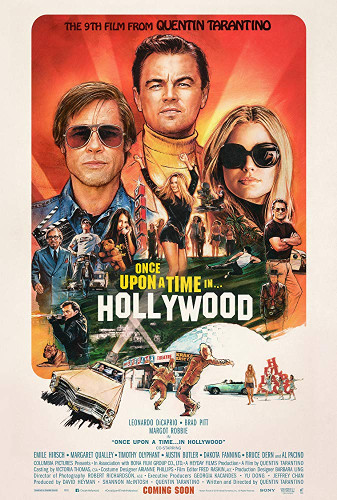
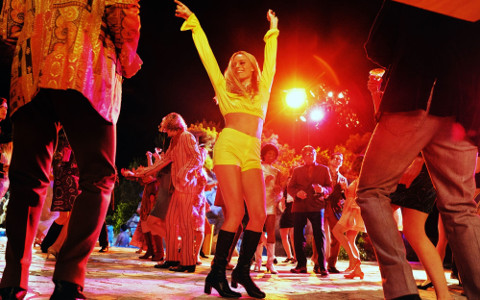
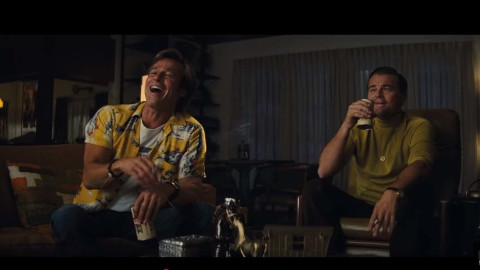



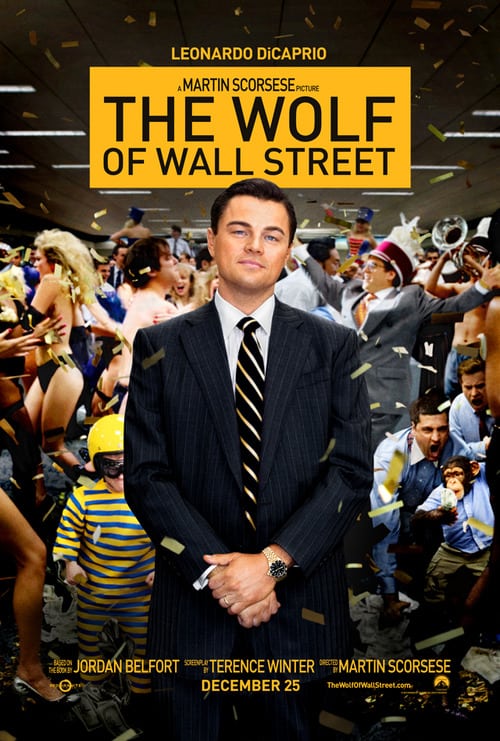
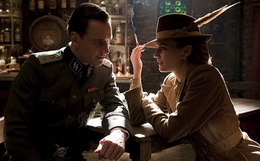

Another amazingly detailed and perceptive review!